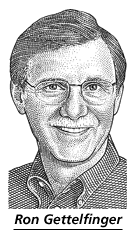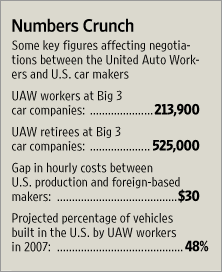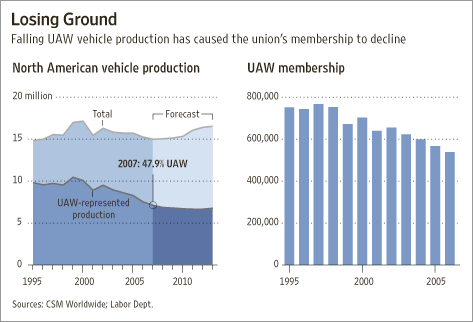Mrjoshua Member Username: Mrjoshua Post Number: 1372 Registered: 03-2005 |
PAGE ONE HAZARDOUS COURSE For UAW Chief, a Bid To Forestall 'Waterloo' Amid Industry's Pain, Ron Gettelfinger Seeks Smaller Concessions By JEFFREY MCCRACKEN June 19, 2007 The Wall Street Journal As Detroit's struggling auto giants enter an epic battle with their unionized workers to reduce costs, they contend they either must win a profound restructuring or face catastrophe. Ron Gettelfinger's plan is to allow neither. The head of the United Auto Workers union is trying to avoid becoming the union leader who ends seven decades of nearly unbroken advances in workers' wages and benefits. He is under unprecedented pressure to give back as much as $10 billion a year to help U.S. car companies stop losing to their lower-cost Asian counterparts -- or see the U.S. companies build more and more of their cars overseas. Former UAW president Doug Fraser calls this "the most difficult time in the history of our union. Period."  Mr. Gettelfinger's strategy so far: Skirt big do-or-die conflicts as long as possible while focusing on numerous smaller ones where he can live with concessions. "The Big Three need, want, something transformational," says David Cole, president of the Michigan-based Center for Auto Research. "They will have their Waterloo now. Ron...and the union think incrementally, and would prefer death by a thousand cuts." In a defiant television interview to be aired this weekend, he blames currency imbalances and unfair foreign-trade practices for U.S. auto makers' competitive problems, and calls on the federal government to fix them. "We can't resolve those issues at the bargaining table," he says on the locally broadcast show Autoline Detroit. As union leaders meet with General Motors Corp. executives today in preparation for a summer of contract talks, the U.S. car companies have aggressive expectations. They want to go far toward eliminating a $30-per-hour gap in compensation they see between their workers and those of foreign-based rivals. And they want workers braced for a deal full of fundamental changes, including increasing what they pay for health-care costs and sharply reducing the time they can be paid after their jobs are eliminated. Mr. Gettelfinger, a onetime assembly-line worker with an accounting degree, has a delicate balancing act. UAW membership has been dwindling along with U.S. car companies' fortunes, while the union has been virtually unable to sign up workers in plants of foreign-based companies -- a pivotal failure hurting its overall bargaining power. This year fewer than half of cars made in the U.S. are being built by UAW members. Recent pacts on retiree health-care concessions have squeaked through with as little as 51% of the vote, possibly leaving Mr. Gettelfinger with little room to maneuver on further cuts. Ron Lare, a tool-and-die worker nearing retirement from Ford Motor Co.'s Dearborn Truck plant after 29 years at Ford, was among the 49% "no" votes when retiree benefits were reduced in 2005 -- partly because he feels givebacks may hurt the union's future. "I'm not a militant. I don't think you always have to fight," he says. But he adds of Mr. Gettelfinger, "I think it's pretty obvious he has to fight concessions if he ever wants to organize workers at Toyota."  Mr. Gettelfinger rose to his post through a relentless attention to detail, and not through an outsized personality. Unlike many UAW leaders, Mr. Gettelfinger has a minimal entourage and seems close to few people. He doesn't drink, quit smoking, doesn't gamble and usually takes his wife, Judy, with him on business trips. He banned traditional Friday golf outings for UAW officials and their management counterparts, to avoid the impression union officials were working less than the people they represent. "I consider him a friend, but it's all business with Ron," says Al Coven, who retired in July 2006 after six years as president of UAW-Delphi Local 699 in Saginaw, Mich. Auto-company executives call Mr. Gettelfinger a shrewd and pragmatic bargainer who has brought a new level of sophistication to the UAW's strategy by digging into the auto makers' finances almost as a private-equity investor or creditor would. To help vet the companies' claims about their predicament, he hired a Wall Street investment bank and law firm to advise him, a departure for the union, and has reached out to certain Wall Street analysts and private-equity fund executives. He keeps a meticulous watch on the UAW's many parallel contract talks: Each bargaining team updates the status of proposals and company responses on three-column charts that his company counterparts call his "tracking documents." In a UAW war room at the union's "Solidarity House" headquarters in downtown Detroit, the union's economists use the sheets to adjust proposals at each of the talks. He likes to outlast opponents by starting early and finishing late, and often drags out meetings by pushing people to support their figures and assertions. "People around the room will look at each other and sigh silently because he asks so many questions and won't let something go," says a person who has been in recent labor negotiations with Mr. Gettelfinger. The union head is extremely cautious about showing his hand in the media and rarely grants interviews except on a friendly morning radio show on Detroit's WJR that blankets the UAW's southeast Michigan heartland. There Mr. Gettelfinger often hits his consistent themes -- the case for nationalizing health care, the need to get tougher on trade -- rather than get into negotiating details. But some of the givebacks he may accept -- and trade-offs he would demand -- are becoming clearer, from discussions with current and former UAW officials familiar with his thinking. The insiders say Mr. Gettelfinger is increasingly open to lump-sum payments for workers in place of some wage increases, which are far more costly to auto makers in part because they increase workers' pensions. BARGAINING TABLE • The Issue: As Detroit's auto makers head to contract talks, UAW Chief Ron Gettelfinger is under pressure to give back billions of dollars in labor costs. • The Background: While auto makers have been posting dire results, the UAW has seen its own numbers -- and clout -- shrink. • Possible Trade-Offs: Lump-sum payments instead of more costly wage increases.Mr. Gettelfinger has begun signaling that the union may need to make work-rule concessions at GM and soon-to-be-independent Chrysler Group's plants to match those already allowed in the past two years at Ford, which he viewed as the most distressed of the three. Ford has been able to hire nonunion workers for functions such as janitors, halving their wages and benefits. Ford's job classifications also were pared, allowing fewer workers and more flexible duties. In reworking health-care coverage, Mr. Gettelfinger wants to limit the burden for new retirees -- those too young to be covered by Medicare, who would feel the biggest hit. He feels retirees already gave enough in difficult 2005 agreements with both GM and Ford, UAW insiders say. But on the WJR radio show yesterday, Mr. Gettelfinger said he now thinks Chrysler needs the same retiree health-care deal, which he refused to give the company before. Some Chrysler officials believe Mr. Gettelfinger's reluctance influenced DaimlerChrysler AG's decision this year to sell off the U.S. arm to private-equity firm Cerberus Capital Management LLC, though he and DaimlerChrysler publicly dispute that was a factor. UAW insiders say Mr. Gettelfinger is willing to let auto makers cut back a wide range of so-called joint programs that provide union jobs but cost auto makers hundreds of millions of dollars a year. They include company-sponsored day care and sponsorship of Nascar races. To slow or stop the membership decline, Mr. Gettelfinger is expected to demand a bigger role for union members in building new innovations such as hybrid engines and clean-diesel technology. UAW membership could sink below 500,000 this year -- half the union's numbers 20 years ago. Mr. Gettelfinger is said to want to tie the union to a potentially growing part of the auto industry. Most makers' hybrid engines are built outside the U.S. The smaller steps can add up. Cost-of-living raises, which aren't matched at Toyota Motor Corp. and other foreign makers, cost $300 million at GM alone, according to GM's estimate. UAW workers also get an average 16 more minutes a day in break time compared with Toyota or Honda's plant workers, according to the U.S. companies. That costs Ford, for instance, about $200 million a year, or $70 a vehicle. Mr. Gettelfinger has been preparing the ground for change by lowering union members' expectations, says one former senior UAW official. In a speech he made at the UAW's constitutional convention in Las Vegas in June 2006, Mr. Gettelfinger told members, "The kind of challenges we face aren't the kind that can be ridden out. They're structural challenges, and they require new and farsighted solutions." But the U.S. auto makers have bigger ideas in mind to get closer to $10 billion in savings. One major objective, especially for GM and Ford, is getting some or all of $95 billion in retiree health-care liabilities off their books, by spinning it into a separate, off-balance-sheet trust that would be protected from losses even if an auto maker went into bankruptcy proceedings. That alone, they say, could close almost half the gap in labor costs -- about 60% of which comes from retiree pensions and health care. Management in Detroit has talked tough about pushing back UAW labor costs many times, only to accept the status quo. But the last two years have been different, after the bankruptcy of auto-parts-making giant Delphi Corp., buyouts of more than 70,000 auto workers, a steep sales slide at Ford and the Cerberus deal last month. Most importantly, car makers -- once virtually hostage to UAW strike threats -- have advanced the globalization of their operations to the point where the union's power to control production is rapidly diminishing. Chrysler recently announced plans to build a $570 million engine factory in Mexico, and GM and Ford also have been building more of their mainstream U.S. models there. Chrysler has a deal to build small cars in China. Ford plans to build a forthcoming subcompact sedan in Brazil. In years past, UAW presidents would rally the rank and file ahead of a bargaining year by vowing to battle for substantial gains in wages and benefits. But that suits neither the situation nor Mr. Gettelfinger's style, some union and industry officials say. Raised on a farm outside Depauw, Ind., near the Kentucky border, Mr. Gettelfinger often talks tough about management and sometimes spices his barbs with barnyard images. He once called executives of Delphi "hogs slopping at the trough." He started his career as a chassis-line repairman at Ford's Louisville, Ky., assembly plant in 1964, earned his accounting degree at Indiana University in the 1970s and became the UAW plant chairman in 1979. He emphasized quality-improvement issues and is credited by Ford managers at the plant with saving it from closure. In 1998 he was elected a UAW international vice president and was voted into the top job in 2002, the favored candidate of the fiery outgoing president Steve Yokich. "He thought Ron was very bright, very capable and what he lacked in ward-heeling he more than made up for in hard work," says Pete Pestillo, former head of Ford labor relations, who has worked closely with both men. In 2003 Mr. Gettelfinger was able to win a relatively flush contract with all three auto makers. Along with overall wage increases of 5% during the four-year deal, Mr. Gettelfinger preserved a program called the Jobs Bank, which since the 1980s has effectively required the Detroit auto makers to pay laid off workers nearly full wages for years even if their jobs were clearly and permanently gone. An early riser who likes to start work as early as 5:30 a.m., Mr. Gettelfinger saw his endurance as a bargaining advantage, say UAW officials. "Ron negotiated for 50 straight hours in September 2003 during national talks with Chrysler. Then he called the meeting done at 1 a.m.," said a person involved in the negotiations. "Two hours later he was banging on doors, saying, 'OK, let's get it going.' He is indefatigable." But events overtook the deal and forced Mr. Gettelfinger into a painful retreat. By March 2005, GM Chairman and CEO Rick Wagoner warned that the company's results would be far worse than expected when the last contract was signed, as GM's U.S. sales were slumping despite costly discounts. Mr. Wagoner blamed the huge debts owed to retired employees, and hinted GM might impose cuts in retiree benefits unilaterally and let the union fight them in court after the fact -- an uncertain proposition.  Mr. Gettelfinger demanded time to conduct his own review. He took the unusual step for the UAW of hiring an investment-banking firm, Lazard Ltd., along with the New York-based law firm Cleary Gottlieb Steen & Hamilton and Milliman, a Washington, D.C.-based actuary, to study GM's finances and economic projections. The point was to convince UAW skeptics that GM needed the help, say UAW insiders. Mr. Gettelfinger also toured the company's normally secret design studios to study clay models of vehicles that GM had planned for the coming years. His conclusion and Lazard's: Despite a potential uptick from the new car models, GM was in even worse shape than it wanted to admit. Mr. Gettelfinger took months to agree to a package of health-care concessions, and then almost upended the deal when his negotiators proposed that the auto maker shift its health-care liabilities to a UAW-managed fund. GM negotiators at the time decided to take the health-care deal they had in hand rather than spend weeks or months diving into Mr. Gettelfinger's new proposal. UAW retirees now pay as much as $752 a year per family for coverage; they had no out-of-pocket expenses before. The deal was expected to save GM $13 billion over six years. In the TV interview to air this weekend, Mr. Gettelfinger calls the agreement "the most difficult decision I ever had to make in all of the years I have been involved with the union," and adds, "Maybe not doing anything in '05 would have been the right thing to do. Is there ever any end to it?" At the time, Mr. Gettelfinger warned members the alternative outcome could be a bankruptcy filing for GM. The deal passed in October 2005 with 61% in favor, a close vote by union standards. Then a similar pact with Ford squeaked by with less than 51% of the vote, the UAW said. Mr. Gettelfinger then dragged out similar talks with Chrysler and never concluded a deal. Write to Jeffrey McCracken at jeff.mccracken@wsj.com |